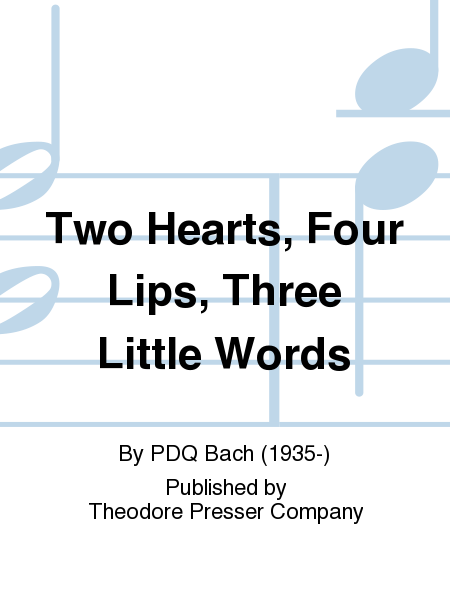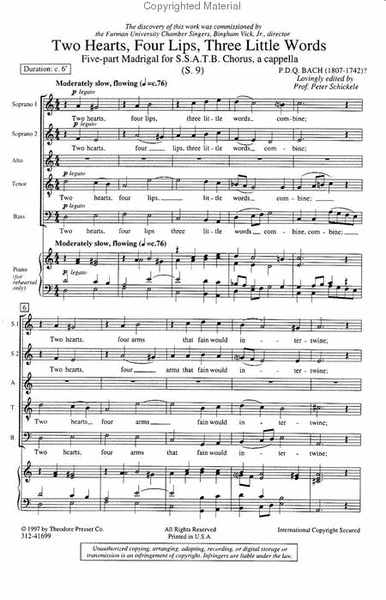Two Hearts, Four Lips, Three Little Words
Five-Part Madrigal for S.S.A.T.B. Chorus, a Cappella
-
Ships in 1 to 2 weeks
Details
Description
SKU: PR.312416990
Five-Part Madrigal for S.S.A.T.B. Chorus, a Cappella. Composed by PDQ Bach. Edited by Professor Peter Schickele. Sws. Choral. Score. With Standard notation. S 9. Duration 6 minutes. Theodore Presser Company #312-41699. Published by Theodore Presser Company (PR.312416990).ISBN 9781491108079. UPC: 680160050567. Octavo inches.
Paris Mountain, in Greenville, South Carolina, would seem to be an unlikely place to discover an original music maniscript by any composer, much less an 18th-century German composer who, as far as we know, never visited the New World. And it is. So unlikely, in fact, that the present editor felt it incumbent upon himself to proceed with extra caution, and to review in great detail his discovery of the manuscript. After all, he had more or less gathered it while picnicking on Paris Mountain, and he could not help but recall the fate of the 18th-century composer Johann Schobert, who died from eating mushrooms gathered in just such a picnic. The fact that Schobert died in Paris (France) made the coincidence all the more chilling. But a careful analysis of laboratory tests and internal evidence has left little dout in the editor's little mind that the work is indeed an authentic P.D.Q. Bach opus, and a welcome addition to his previously-discovered madrigals, THE QUEEN TO ME A ROYAL PAIN DOTH GIVE and MY BONNIE LASS SHE SMELLETH. Written in the same neo-Elizabethan music language as the other two works in this genre, TWO HEARTS, forces upon us the conclusion that the style of Byrd and Weelkes was no mere passing wind, but rather something that made a deep impression on P.D.Q. Bach, like hailstones. The German composer had been introduced to English music by his friend Count Pointercount, a Norman nobleman whose ancestry lay, as often as possible, on both sides of the English channel. The Count had a wife named Thusnelda, but that's another story.
Paris Mountain, in Greenville, South Carolina, would seem to be an unlikely place to discover an original music maniscript by any composer, much less an 18th-century German composer who, as far as we know, never visited the New World. And it is.So unlikely, in fact, that the present editor felt it incumbent upon himself to proceed with extra caution, and to review in great detail his discovery of the manuscript. After all, he had more or less gathered it while picnicking on Paris Mountain, and he could not help but recall the fate of the 18th-century composer Johann Schobert, who died from eating mushrooms gathered in just such a picnic. The fact that Schobert died in Paris (France) made the coincidence all the more chilling.But a careful analysis of laboratory tests and internal evidence has left little dout in the editor's little mind that the work is indeed an authentic P.D.Q. Bach opus, and a welcome addition to his previously-discovered madrigals, THE QUEEN TO ME A ROYAL PAIN DOTH GIVE and MY BONNIE LASS SHE SMELLETH.Written in the same neo-Elizabethan music language as the other two works in this genre, TWO HEARTS, forces upon us the conclusion that the style of Byrd and Weelkes was no mere passing wind, but rather something that made a deep impression on P.D.Q. Bach, like hailstones. The German composer had been introduced to English music by his friend Count Pointercount, a Norman nobleman whose ancestry lay, as often as possible, on both sides of the English channel. The Count had a wife named Thusnelda, but that's another story.


 Share
Share